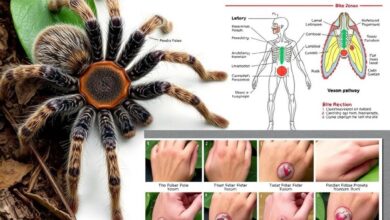Treating Swelling from Tarantula Bites

Have you ever met a tarantula in the wild and wondered what to do if it bites you? Tarantula bites can be scary, leading to painful swelling and discomfort. But, there are ways to treat the swelling and help it heal. We’ll look at the best ways to deal with tarantula bite swelling. This includes first aid, home remedies, and knowing when to get medical help.
Understanding Tarantula Bites
Tarantulas are big, hairy spiders found all over the world. Their venom is usually not dangerous to humans, but tarantula bites can cause swelling, pain, and other symptoms. It’s important to know about the different tarantulas and their venom to understand these bites better.
Types of Tarantulas and Their Venom
There are many tarantula species, each with its own venom. Some, like the Poecilotheria genus, have venom that can cause a lot of pain and swelling. Others, such as the Grammostola genus, have venom that doesn’t hurt as much.
Symptoms of Tarantula Bites
- Immediate pain and swelling at the bite site
- Redness and inflammation around the affected area
- Itching or numbness in the bitten region
- Nausea or vomiting in some cases
- Muscle spasms or cramps near the bite
The symptoms can vary based on the tarantula type, venom amount, and how sensitive you are to it. Most symptoms are local and can be treated with first aid. But, in some cases, reactions can be severe and need quick medical help.

First Aid for Tarantula Bites
When you get bitten by a tarantula, quick first aid is key. The first step is to apply a cold compress to the bite area. This helps lessen swelling and pain, which are common signs of a bite.
Next, make sure to clean the bite area well. Use soap and water to wash it gently. This prevents infection. But, don’t rub or irritate the bite as it can make things worse.
These first steps help manage the bite’s immediate effects. They also get the area ready for more treatment if needed. Staying calm and acting fast is crucial for a quick recovery.
Even with these steps, seeing a doctor is key if the bite reaction is severe or you’re worried. A healthcare professional can manage the bite well and prevent future problems.
Home Remedies for Tarantula Swelling Treatment
If you’ve been bitten by a tarantula, the swelling can be uncomfortable and unsightly. Luckily, there are several home remedies that can help. These natural treatments are great for reducing swelling and inflammation from the bite.
Creating a potato poultice is a good home remedy. Just slice a fresh potato and put the slices on the affected area. The potato’s natural compounds can lessen swelling and soothe the skin. Or, you can make a baking soda paste by mixing it with a bit of water. Apply this paste to the bite site to ease discomfort and help healing.
- Potato poultice: Slice a fresh potato and apply the slices directly to the bite site to reduce swelling.
- Baking soda paste: Mix baking soda and water to create a paste, then apply it to the affected area for soothing relief.
Using cold compresses is another way to help with swelling. A cold, damp cloth or an ice pack on the bite can constrict blood vessels and reduce inflammation. This simple method can offer relief and support your body’s healing.
Adding these natural home remedies to your care routine can help manage swelling and discomfort from a tarantula bite. While these treatments are useful, always see a doctor if you have severe reactions or concerns about the bite.
When to Seek Medical Attention
Many tarantula bites can be treated at home with first aid. But, knowing when to see a doctor is key. Signs that mean you need a doctor include difficulty breathing, extreme pain, or signs of systemic illness.
Severe Reactions to Tarantula Venom
Sometimes, a tarantula bite can cause severe reactions to the venom. These reactions may include:
- Difficulty breathing or swallowing
- Severe, persistent pain at the bite site
- Rapid heartbeat or irregular pulse
- Nausea, vomiting, or diarrhea
- Dizziness, confusion, or loss of consciousness
- Allergic reactions, such as hives, swelling, or anaphylaxis
If you or someone you know has these severe symptoms after a tarantula bite, get medical help right away. Quick action can prevent serious problems and help you get better.
Even though most tarantula bites aren’t dangerous, it’s wise to be careful. If you’re worried or have bad symptoms after a tarantula bite, see a doctor. Your health and safety are most important.
Preventing Tarantula Bites
Avoiding tarantula encounters is the best way to prevent bites. By identifying tarantula habitats, you can stay away from these spiders. This reduces the risk of getting bitten when they defend themselves. Tarantulas live in quiet spots, like under rocks or in woodpiles. So, be careful when you’re moving things in these places.
Identifying Tarantula Habitats
To avoid tarantula bites, know where they live. These spiders like to be in certain places:
- Woodpiles or other stacks of natural materials
- Under large rocks or logs in forested areas
- In burrows or other underground shelters
- In the crevices of old buildings or structures
Knowing where tarantulas live helps you stay alert and avoid them. Keep a safe distance and be careful when near their homes. This way, you’re less likely to get bitten.
Remember, tarantulas are usually not aggressive unless they feel threatened. By giving them space and not bothering them, you can enjoy watching these interesting spiders. This also keeps you safe.
Tarantula Swelling Treatment
If a tarantula bite gets worse or doesn’t get better, you might need to see a doctor. They might give you medicines like antihistamines or painkillers. These help with the swelling and make you feel better.
Medications and Antivenoms
Sometimes, doctors might give you antivenom. This special medicine fights the venom and helps you heal faster. They will look at how bad your symptoms are and decide what treatment you need. This could be medicines or antivenom, or both.
If you have a bad reaction, like a lot of swelling or trouble breathing, get medical help right away. Acting fast can stop serious problems and help you get better from the bite.


